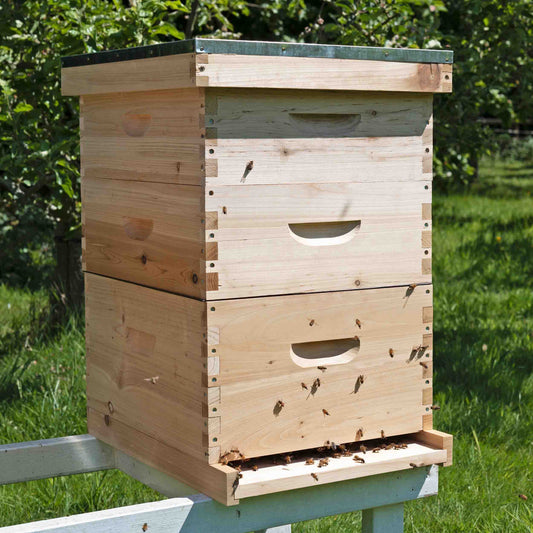
Summer Harvest
At last, it’s July. Within four more weeks the major honey harvesting period is over except for those individuals who have access to the mysteries of heather honey.
Here on the parched plains of Kent the honey flow is often over by the second week of July. I got caught out last year: all the usual nectar-bearing plants had gone to seed and little nectar was coming in. I took off all my honey then and started varroa treatments.
In the cherry orchard where I keep my bees, they chose not to pick the fruit. Rain had damaged the crop and it was left to go to waste. The bees went mad on this bonanza of sugar-ripe juice oozing out of the cherries and filled supers with thick, dark red honey. Mine enjoyed that for their winter feed, whilst a fellow beekeeper, being less hasty with his harvest, had a superb colour honey which he sold at a premium price.
My wife says I’m mean; I prefer to say I’m frugal and recycle where necessary. Glass jars are expensive and I recycle where I can. Friends, relatives, and gratuitous receivers of my honey are instructed to recycle the jars back to me, as are my regular customers.
I don’t put labels on these jars anymore but print a nice disc label which goes on the lid; trying to remove the sticky remains of labels from a jar is a thankless task, but dishwashing jars must be
better environmentally than sending them to be melted down.
I get through quite a few jars and order in bulk to get a good price. It’s worth shopping around: one very popular supplier with beekeepers had a reasonable price on their jars until delivery when very cheeky £60 was added on for a pallet. More research found the jars I wanted at a good price, free delivery, and a free pallet.
Later, in the winter, the pallet was turned into hive stands and floorboards. The downside of this was that some three thousand nine hundred jars were dumped on my driveway for me to get into storage before it rained. Fortunately I had a plan: two fellow beekeepers who just wanted a couple of hundred jars between them agreed to help me move the jars into storage if I sold them their jars at my cost price. A good deal done by both sides, I thought.
So, with honey off, it’s time for varroa treatment and winter feed. I like to feed early to get the queen laying those diutinus bees — their longevity enhanced by larger fat bodies with vitellogenin, made possible by no longer having to work themselves to death for the winter stores.
I have a few nucs garnered during the swarming season. Some I will keep as backup; others I will unite and use the spare queens to replace any red queens that I might still have lurking around.
I do wish bees would obey the rules. This last week I had two blue queens determined to swarm; this year’s queens should have the decency to hang on until next year.
Anyway, no matter — I have found a foolproof swarm prevention measure that doesn’t involve a Demaree or splitting the hive. More of that another time…
Look out for more insights from Malcolm in future months and on our website. Happy beekeeping!


